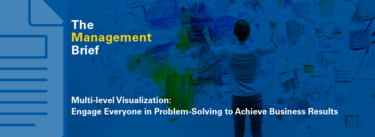It’s our first just-in-time roundup of 2015! Check out these five recently published lean-themed articles you may have missed the last few weeks (and a bit before the holidays). Our purpose with these lists? It’s to make the work of the lean community and lean thinking in other industries more visible. What else have you been reading and sharing with your team members? Let us know in the comments below.
1. “How to Prevent Experts from Hoarding Knowledge,” by Dorothy Leonard in Harvard Business Review
Lean thinking necessitates knowledge sharing in the organization, and in many ways, makes way for it. But knowledge management isn’t easy for any organization. “In our research on knowledge transfer, we have seen companies greatly disadvantaged, if not crippled, by knowledge loss,” writes Dorothy Leonard. It’s not just a lack of time or knowledge management resources that creates the problem, Leonard says. Experts across all functions aren’t begin asked to share what they know and there aren’t organizational systems in place for using team members’ knowledge well. This article doesn’t go so far as to tell you how to create strong knowledge management systems or practices, but it covers the “why” of why it’s important to take your team members’ hard-earned knowledge, craftsmanship, and expertise seriously. “As a manager, don’t wait until an individual has a monopoly on certain kinds of know-how,” she writes. “Set systems in place to prevent it long before it’s time for an individual to retire.”
2. “Automation’s Adverse Effects,” by Theodore Kinni in strategy + business
Nicholas Carr’s most recent book, The Glass Cage: Automation and Us addresses questions about the future of work and manufacturing, the limits of machines, and the significance of “a human touch” no matter how automated work gets. Carr’s approach to dealing with the rise of automated work sounds lean to us: “Rather than beginning with an assessment of the capabilities of the machine,” writes Carr, “human-centered design begins with a careful evaluation of the strengths and limitations of the people who will be operating or [interacting] with the machine… The goal is to divide roles and responsibilities in a way that [keeps] workers engaged, active, and alert—in the loop rather than out of it.”
3. “Scrum: Evolution and New Frontiers,” an interview in Planet Lean
In an interview with Planet Lean, Jeff Sutherland, co-creator of Scrum, talks about the roots of Scrum in lean thinking, the points of intersection between lean thinking and Scrum, the relationship between kanban and Scrum, agile methodologies in education, and why this methodology is so transformative for leadership.
4. “Toyota Releases Fuel Cell Patents for Royalty-Free Use By All,” Mashable
During the first week of the new year Toyota “rocked the auto industry” by announcing that it’s opening to the public 5,680 of its patents on fuel cell technology for royalty free-use. Time will tell what this means for electric cars versus hydrogen fuel cell powered cars, but it’s certainly interesting news that will shape other automakers’ next moves. What do you think of the announcement? What are the benefits or drawbacks of sharing what you know with competitors?
5. “MVPs and Excellence,” by Eric Ries on the Startup Lessons Learned blog
After a successful Lean Startup conference in December, Eric Ries and his team are listening to their customer who say they are getting a lot of pushback on the MVP (minimum viable product) idea since for some companies, “minimum viable” is associated with low quality. This prompted Ries to blog on the topic: “With an MVP we are not asking our teams to deliver low-quality work, we’re adopting a strategy for driving excellence throughout the organization.” We enjoyed Ries’s thoughts on experiments being part of the pathway to excellence, the importance of cross-functional teams in improving products, and why organizations need to be thinking about “process” much more than “perfect” when it comes to quality.





